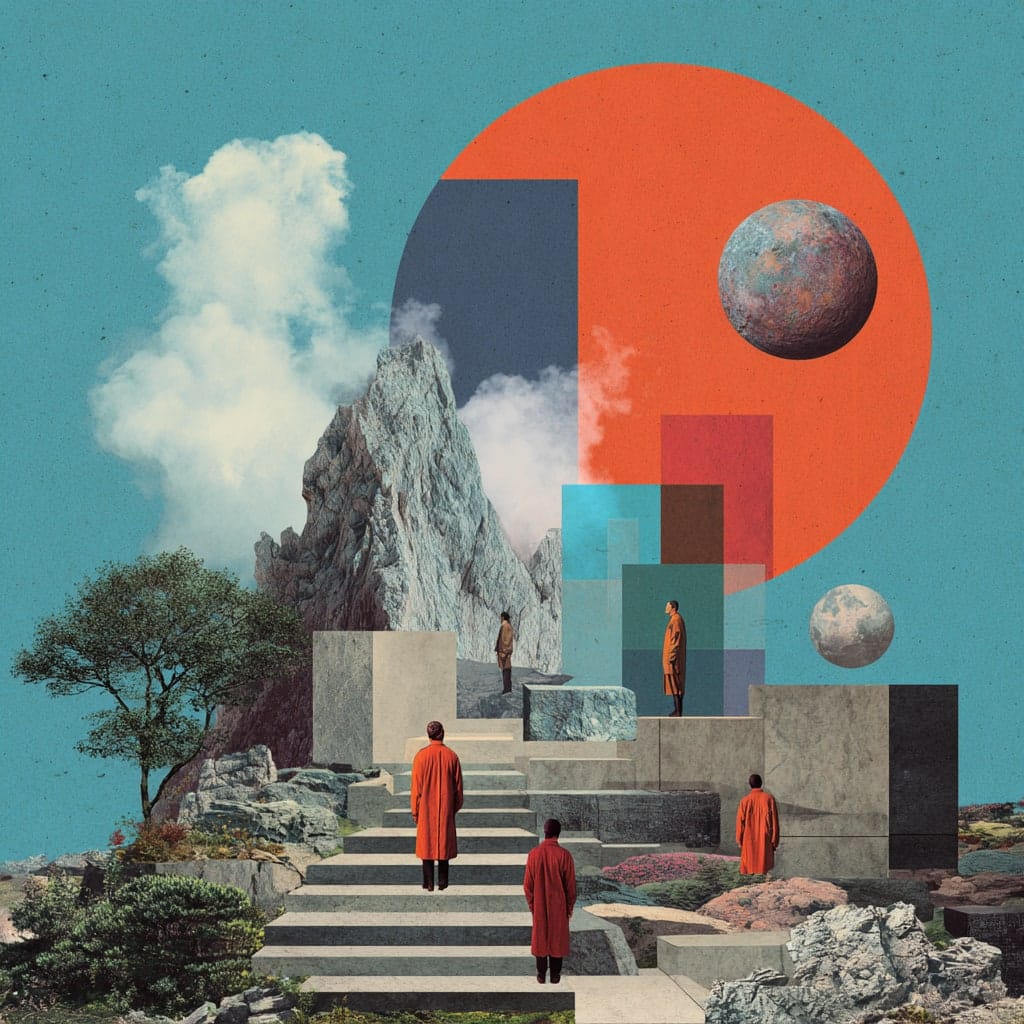Human literacy ⊗ Polytunity ⊗ Africa and the world map
No.369 — African time concepts and futures thinking ⊗ ChatGPT’s memory dossier ⊗ Resilient food systems ⊗ Artificial light has essentially lengthened birds’ day

Human literacy
Eryk Salvaggio distinguishes AI literacy—knowing how AI processes language and generates text or images—from human literacy, the skill of making emotional meaning and connecting through stories. Without human literacy, people can mistake word order for understanding and be seduced by AI’s stripped‑down, decontextualised outputs, which may reinforce narrow, isolating narratives. Human literacy helps us recognise subtle references, use AI as a tool to tell our own stories, and preserve imagination and dignity against a market that reduces content to analysable chunks. We should treat AI as an augmentation, not a substitute, for the human work of interpreting, creating and sharing meaningful stories.
One of the better formulations of what people mean when they say they want to know there is a human behind things. That’s usually a very blurry thing that they can’t quite explain. Or at least they can’t quite explain how they would see the difference. Here Salvaggio is a lot clearer in explaining the meaning of contemplating something human. It’s still not a formula, or a list of checkboxes, or a test, but that’s kind of the point, and he presents it well.
There is no person behind the language produced by a chatbot. It’s a dilution of billions of people, like adding water to sugar until the sweetness dissolves.
In other words, Homeopathic Humanity. Homeopathic Intelligence. It’s supposed to be there, some believe it is there, but only in trace amounts.
We rarely acknowledge that the poetic is different from a poem. The poetic can arise from a collision of contexts that creates a more resonant, yet unexplainable link between the events and emotions they draw out of you. Words build that up for us. But they don’t do it. […]
Meaning is a power in how we read, deeply influenced by the experience we are having when words come to our attention. That is Human Literacy: to know why the things that have meaning to you have meaning at all. […]
You want meaning, even as we are trying to strip it out of things and make them analyzable, because you are alive and will inevitably have a unique experience of the world. […]
The reality is that your voice does not really resonate in the world until someone hears it, and the more you distort your voice [using AI to write], the less we really hear from you.
Polytunity
It’s not something I officially look at, measure, or which would necessarily mean something, but the above and this one, as a combo, are very very high on the “highlights + enjoyment” meter.
Moving from polycrisis to polyunity is not just a semantic exercise. It is an invitation to change the paradigm from which we interpret reality and design the future.
Yuen Yuen Ang, the Alfred Chandler Chair Professor of Political Economy at Johns Hopkins University, traces how development theory and practice have remained trapped in what she calls the “industrial-colonial paradigm,” which treats societies as machines requiring Western-style institutions for progress. She proposes AIM (Adaptive, Inclusive, Moral Political Economy (added to the pile of favourites)) as an alternative framework that views development as a coevolutionary process rather than a linear one. This approach recognizes that successful development often begins with societies creatively using existing resources and arrangements that may appear weak or wrong by Western standards. Her research demonstrates that market-building institutions differ fundamentally from market-preserving ones, challenging the assumption that all countries must follow the same institutional templates.
In the west we often say we should use/copy indigenous or “third world” ancestral knowledge and jugaadish innovation. We rarely wonder how we can or even should simply get out of the way and, as the young’uns say, “let them cook.” Indigenous people know how to manage forests, so we think “let’s hire them to do so” or come up with some partnership where we, of course, are the lead partners. But we don’t spend much time considering just giving back the unceded land. I don’t know if that would be the right solution or not, but it really doesn’t seem to be in the list of things considered.
Even as disruptions rattle the global development industry, it clings to this industrial–colonial paradigm, inherited from the eighteenth through twentieth centuries. Indeed, it is doubling down. […]
Imagine a depository of knowledge on “using what you have”—indigenous innovation, possibly enhanced with modern technologies. Or a systematic collaboration between researchers and practitioners, on a scale comparable to the World Bank’s “good governance” campaign in the 1990s. […]
Polycrisis is a descriptor that the establishment can agree on without challenging itself. It abstracts the causes of crises, making them appear as natural convergences rather than the systemic outcomes of extractive and exclusionary orders. And it makes the concept appear global when in fact the voices, experiences, and priorities it reflects are overwhelmingly Eurocentric. […]
Societies do not need perfect Western-style institutions before they can grow. They begin by creatively repurposing what exists, even when those arrangements look weak, wrong, or backward by first-world standards.
§ Africa wants its true size on the world map. “‘(Mercator) is the world’s longest misinformation and disinformation campaign, and it just simply has to stop,’ Moky Makura, executive director of advocacy group Africa No Filter, told Reuters. The group champions the introduction of the Equal Earth projection, which aims to give Africa its magnitudinal due. … ‘Maps are not neutral,’ Fara Ndiaye, the co-founder of Speak Up Africa, told The Washington Post. ‘They were never meant to be. They shape how we learn, how we imagine power, how we see ourselves.’”
§ Internet Phone Book. I might have mentioned it before, but since then I’ve gotten my hands on one, beautiful! A little bird told me the arrival of the reprint is imminent. “An annual publication for exploring the vast poetic web, featuring essays, musings and a directory with the personal websites of hundreds of designers, developers, writers, curators, and educators. Published since 2025.”
Futures, Fictions & Fabulations
- Mumbi Macharia on African time concepts and futures thinking “The western approach to futures thinking focuses on the abstract idea of time... ‘something out there.’ A Swahili perspective is one of experiencing emerging realities, the future entering into us to transform itself through us. This enaction - a dynamic process where the body, action, and environment are mutually co-creative - doesn't make the future an onto-epistemological exercise, but sees the future as a co-created reality transforming our ‘now.’”
- Technology 2040 — A vision for the European Space Agency. “Embarking on any journey into space is essential for the advancement of humanity. By exploring – and settling – in space, we drive technological innovation, identify valuable resources and inspire global collaboration. This endeavour not only addresses pressing challenges on Earth, including resource scarcity and environmental sustainability, but also pushes the boundaries of our knowledge and capabilities.”
Algorithms, Automations & Augmentations
- I really don’t like ChatGPT’s new memory dossier. “Has there ever been a consumer product that’s this capable of building up a human-readable profile of its users? Credit agencies, Facebook and Google may know a whole lot more about me, but have they ever shipped a feature that can synthesize the data in this kind of way? … As a power user and context purist I am deeply unhappy at all of that stuff being dumped into the model’s context without my explicit permission or control.”
- There is a ‘bubble risk’ in the S&P 500, Deutsche Bank says: ‘We appear to be in uncharted territory’. “Nvidia and just four other stocks (Microsoft, Alphabet, Apple, and Amazon) compose 30% of the S&P 500’s entire value. For comparison, the concentration of the top five companies in the S&P during the dotcom bubble of 2000 was less than half that.”
- AI generated ‘Boring History’ videos are flooding YouTube and drowning out real history. “It quickly became obvious to me that all of these videos are AI generated, and that they are part of a sophisticated and growing AI slop content ecosystem that is flooding YouTube, is drowning out human-made content created by real anthropologists and historians who spend weeks or months researching, fact-checking, scripting, recording, and editing their videos, and are quite literally rewriting history with surface-level, automated drek that the YouTube algorithm delivers to people.”
Built, Biosphere & Breakthroughs
- Building resilient food systems: lessons for Australia from global models. “Global examples like Brazil’s Belo Horizonte and the US Food Policy Councils show how integrated, decentralised governance can improve food security, equity, and sustainability.”
- What it will really take to electrify all of Africa. “The electricity deficit may well be worsening. In a 2024 report on universal energy access in Africa, researchers from the Center for Strategic & International Studies, in Washington, D.C., concluded that ‘demand is significantly outstripping supply, and the energy crisis is deepening.’”
- Bison revival shows the power and complexity of rewilding. “The comeback of America’s largest land mammal is boosting soil health and plant nutrition, yet their numbers may be slowing aspen recovery sparked by wolf reintroduction.”
Asides
- Artificial light has essentially lengthened birds’ day. “For these birds, effectively their day is almost an hour longer. They start vocalizing about 20 minutes earlier in the morning and they stop vocalizing about 30 minutes later in the evening.”
- Students are on track to lose 25 years to their phones. “Our national study, as featured in The Times, reveals how excess and uneducated smartphone use is reshaping student focus, wellbeing, and performance.” [Note however that this is research from a screentime restriction app.]
- An exotic quartz arrow may have killed a man 12,000 years ago in Vietnam. “TBH1 was likely cared for by his community, Rivera said, since the man survived his initial injury and was buried carefully in the cave.”

